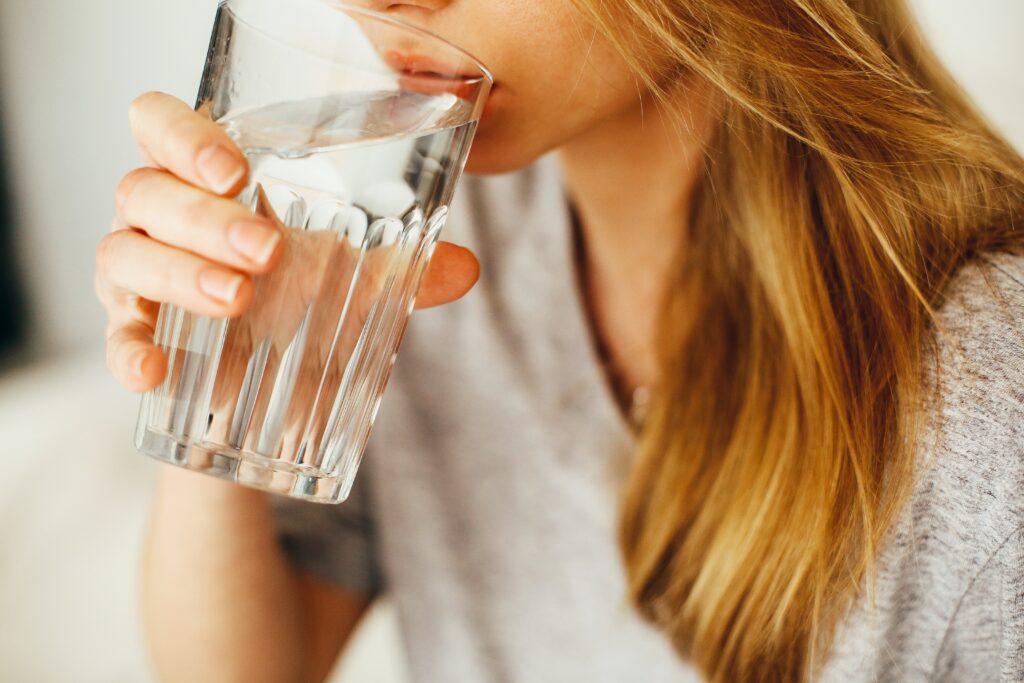
Hydration for Weight Loss?
All weight that you lose isn’t equal.
Yes, we may have fat to lose but if you feel you have put on a lot of weight quite quickly the odds are it is excess fluid being held by your body.
Water Weight
Electrolytes are minerals with an electric charge that play important roles in regulating water balance (cell hydration) therefore if your levels are out of balance it can cause shifts in body weight.
Ideally you need to tailor your electrolyte intake to your fluid intake so as to find your natural balance.
You may need more electrolytes if:
- You drink large amounts of fluid – as you can lose too many too quickly through passing urine too often.
- If you sweat a lot through climate or exertion
- Or you don’t get enough salt in your diet
The main electrolytes are:
- Magnesium
- Potassium
- Sodium
- Chloride
- Phosphate
- Calcium
Magnesium has over 600 roles in the human body. It plays a key role in balancing our hydration levels. The RNI for women is 270mg although baring any kidney issues it is impossible to take in excess. Studies in women show that it can reduce water weight and pre-menstrual syndrome (PMS).
Magnesium Rich Foods
- Dark Chocolate
- Dark green leafy vegetables
- Nuts
- Wholegrains
- Meat and animal products
Potassium along with Sodium and Chloride are involved in the regulation of water and fluid balance in the body. The RNI for potassium is 3,500mg per day.
Potassium Rich Foods
- Dark green leafy vegetables
- Beans
- Bananas
- Avocados
- Tomatoes
- Yoghurt and other dairy products
The main roles of sodium in the body are to assist in the regulation of the body’s water content. Adults should not take more than 2.4g of sodium per day (6g salt, approx 1 teaspoon).
Main sources of Sodium
- Bread and rolls
- Cold cuts and cured meat
- Soups
- Cheese
- Processed food
Chloride is formed when the gas Chlorine is dissolved in water. It works with potassium and sodium to control the passage of fluid in the blood vessels and the tissues and also to regulate acidity in the body.
Main sources of Chloride
- Seaweed
- Rye
- Tomatoes
- Lettuce
- Celery
- Olives
Phosphates and Calcium are found in all of the above foods.
The Importance of Hydration
Being well hydrated can reduce water retention. The body is always trying to find its natural balance therefore if you are constantly dehydrated your body will tend to retain more water in an attempt to prevent hydration levels becoming too low.
Water intake is important for liver and kidney health which may reduce water retention in the long term.
Good hydration supports fat loss and brain function.
Can ‘Cutting Carbs’ drop water weight?
Carbohydrates are stored in the muscles and liver as glycogen. Glycogen also pulls water inside with it. For every gram of glycogen you store, 3-4 grams of water may be stored with it. This is why a ‘low carb’ diet can show an immediate and pleasing weight loss on the scale and your
Carbohydrates also lead to a rise in the hormone Insulin. Insulin can increase sodium retention and reabsorption of water in the kidneys. A ‘low carb’ diet leads to a drop in insulin levels which then leads to a loss in sodium and water from the kidneys. You may need to adjust your carbohydrate intake to see what works for you.
Low Carb diets such as Ketogenic (Keto) suggest reducing carbohydrate intake to 50g per day. This doesn’t suit everyone and can be hard to sustain. If you are interested in following a lower carbohydrate diet I would recommend tracking your macronutrient intake (CHO, Protein and Fat) for a few days and see where any changes can be made. The key to ‘cutting carbs’ is to avoid processed sugar and refined carbohydrates.
How to Avoid Water Retention
- Reduce excess salt from your diet
- Avoid a sedentary lifestyle – get moving!
- Check any medications you use for this side effect
While you may wish to use a natural diuretic to help reduce bloating at certain times of the month or if you have just over indulged for a few days it is still important to stay hydrated so your cells are happy to release the excess water they are holding on to.
Natural diuretics
- Caffeine in tea and coffee
- Dandelion
- Parsley
- Fennel
- Nettle
- Garlic
- Fruit and vegetables with high water content such as watermelon, cucumber, celery etc
In conclusion, make sure you get a varied and balanced diet while also drinking enough water and fluids to support your lifestyle.
If you would like to chat with me about your unique menopause transition, book a Wild Well-Being call and come away inspired and motivated to begin your journey to optimal health.
